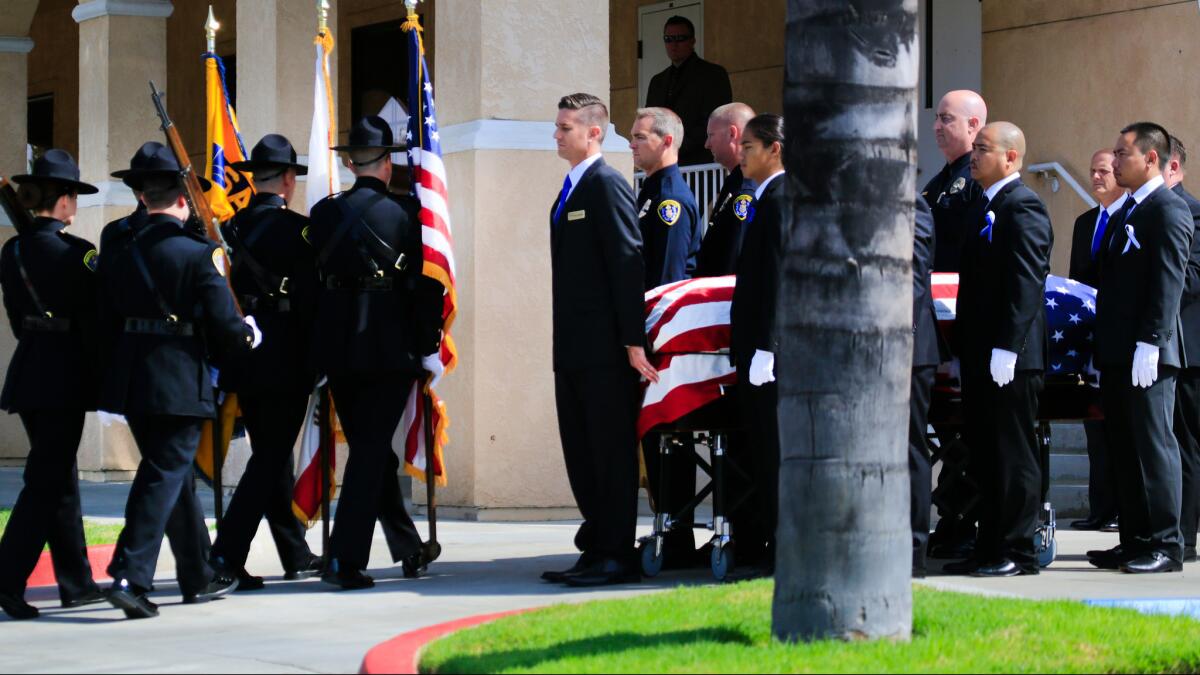Should footage of police officers’ deaths be released? Bill aims to let families decide

- Share via
Reporting from Sacramento — Video or audio footage showing the deaths of police officers in California will not be made public unless their immediate family agrees to release it should a bill passed Monday by the state Senate become law.
Lawmakers in support of AB 2611 by Assemblyman Evan Low (D-Campbell) said the measure protects the families of police officers from having to relive when their loved ones were killed.
“Body cameras are necessary to not only protect potential victims but to also protect the men and women wearing them,” said Sen. Cathleen Galgiani (D-Stockton). “No one should have to worry about an audio or video recording of graphic sounds or morbid images be open to the public to be viewed over and over again, nor should the surviving families of any officers.”
Senators engaged in lengthy debate about the bill on the floor, with opponents arguing that the measure would create a special exemption for police officer families and could result in unforeseen circumstances where there was overriding public interest in the release of such footage, but law enforcement agencies would be unable to disclose it.
Sen. John Moorlach (R-Costa Mesa) said the bill could harm efforts to build trust between the public and law enforcement.
“Transparency in public safety and law enforcement is so lacking,” Moorlach said. “The issues that it creates actually I believe hurts our public safety officials because we’re saying, ‘No, you can’t have this,’ or ‘You can’t see that,’ or ‘You don’t get this video.’ And so we see the public extremely frustrated. Now we’re going to create this bill, another barrier that just raises angst among our constituents.”
The bill passed with a slim majority of 23 senators in favor, with many abstaining. Multiple senators both for and against the bill noted the sensitivity of measures related to the death of law enforcement officers.
Low’s bill is the most narrow in the raft of bills introduced this year to deal with the difficult questions of privacy and transparency as police departments across the state outfit their officers with body cameras. The rest of the measures, including one that would have allowed for public disclosure when officers were accused of excessive force, have failed.
About 10 law enforcement officers have died annually in the line of duty in California since 1980, according to statistics from the state Department of Justice and National Law Enforcement Officers Memorial Fund. Roughly half of those deaths were accidental.
California police departments began adopting body cameras in earnest in early 2015, and Low’s office said it was unaware of any department that has released footage of an officer’s death in response to a public records request.
But body cameras are beginning to capture such incidents.
Last month, San Diego Police Officer Jonathan De Guzman was shot and killed and a second officer was wounded after approaching a pedestrian during a nighttime patrol. The officers didn’t turn on their body cameras before the incident, though the injured officer caught the aftermath on his camera.
Brian Marvel, the president of the San Diego Police Officers Assn., said he supported Low’s bill. Public disclosure of the video of De Guzman’s death would unnecessarily harm his family, Marvel said.
“I couldn’t fathom right now an opportunity where the footage of an officer being murdered should be released,” he said in an interview.
Still, few police departments in California — including the Los Angeles Police Department — release any body camera footage outside of a courtroom because of the state’s already strict laws blocking most law enforcement information from becoming public through open records requests.
San Diego has the largest coordinated effort in the state to release body camera footage, where Dist. Atty. Bonnie Dumanis says her office will make public selected body camera video from officer-involved shootings. But the policy doesn’t call for disclosure in incidents where an officer was killed. A spokesman for Dumanis confirmed that the district attorney has no plans to release footage from De Guzman’s killing.
Gov. Jerry Brown’s administration has called Low’s bill unnecessary, saying the state’s public records law already ensures that most recordings of a police officer’s death would never be released.
“This bill provides privacy protections to peace officers which are greater than those provided to the general public, and moreover implies that the privacy interest of a peace officer’s family outweighs public interest in the events of an officer’s death,” a bill analysis from Brown’s Department of Finance said.
Before the bill heads to Brown’s desk, it has to return to the Assembly for a vote after minor changes were made in the Senate. In May, the Assembly passed an earlier version 76 to 0.
Follow @dillonliam on Twitter
ALSO
Police transparency reaches a stalemate at the Capitol
Police, sheriff finalize body camera policy
City Council vote resumes $57.6-million rollout of LAPD body cameras
More to Read
Get the L.A. Times Politics newsletter
Deeply reported insights into legislation, politics and policy from Sacramento, Washington and beyond. In your inbox twice per week.
You may occasionally receive promotional content from the Los Angeles Times.











